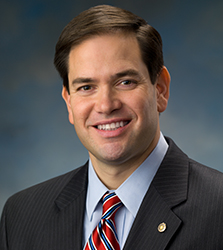
Is Rubio’s Strategy About to Pay Off?
Florida Sen. Marco Rubio has managed to be considered a top-tier candidate with a strong likelihood of winning the GOP nomination, despite polling numbers that have rarely, if ever, passed those of several of his rivals. This seems to be part of his strategy, as Politico explains in an informative article this morning:
Behind Marco Rubio's survival strategy
Marco Rubio won’t finish first in Iowa's caucuses six days from now, but he and his allies have increasingly positioned him to make a third-place showing look like the victory they always wanted.
Like a contestant on a Republican version of “Survivor,” Rubio has long been content to hang with the pack and avoid elimination. For months he has been playing the expectations game—and hearing a chorus of conservatives carping about his campaign’s cool, confident approach. But now, with Donald Trump taking the lead back from Ted Cruz in Iowa, Rubio’s team says the caucuses are setting up to give their candidate the boost he needs to sideline rivals in New Hampshire….
As the top two candidates duke it out, Rubio appears increasingly confident as he closes out a week of campaigning across Iowa. With his establishment rivals seemingly ceding Iowa and campaigning in other states and the two candidates in front of him focused on one another, Rubio suddenly has more space to maneuver. He is amping up his Iowa schedule, holding three or four events a day. While he presses his case for generational change, Rubio is openly relishing the damage Trump is doing to Cruz, whose Iowa support has dipped five points since the start of the year, according to the Real Clear Politics average.
Rubio’s basic strategy seems to be to let Trump damage Cruz in Iowa, then emerge from New Hampshire as the consensus choice of everybody who doesn’t want to see Trump as the Republican standard-bearer:
In Team Rubio’s thinking, Trump’s elimination of Cruz in Iowa will send many of the Texas senator’s supporters to the Florida senator, who has a similar conservative voting record as Cruz – except for immigration. Under their theory, Cruz will be damaged goods heading into New Hampshire and that will help Rubio bounce into contention for second place with [John] Kasich. Most consultants, including Rubio’s team, say they can’t see Kasich expanding his appeal beyond New Hampshire until March, when Ohio holds its primary. And, they say, [Chris] Christie won’t survive past New Hampshire if he remains stalled in single digits despite spending more time there than in his home state of New Jersey.
So just as Rubio’s backers hope Iowa kills off also-rans like Mike Huckabee and weakens Cruz, they’re counting on New Hampshire to do the same to Christie and Kasich. Bush, Rubio’s team thinks, hangs on to compete in South Carolina, where he has the added benefit of the support of Sen. Lindsey Graham, whose home state infrastructure could give Bush a boost in a state his family has never lost.
“What will make post-New Hampshire different is that Bush will be out of money and he won’t have finished ahead of Marco or in the top three in Iowa and New Hampshire,” another Rubio backer familiar with the campaign’s thinking said. “So Marco sees this as a chance to make South Carolina a real two-man race, if not a three-man race with Trump and Cruz.”
The Rubio campaign strategy has been evident for some time, and by and large it seems to have worked out largely as planned. But the same thing can be said of several other candidates, including Cruz and Kasich, who has campaigned with the idea that a strong showing in New Hampshire would launch his campaign into contention. Once the voting starts next Monday evening in Iowa, it should rapidly become clear which candidates’ strategies have a chance, including Rubio’s.



